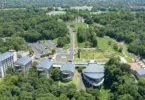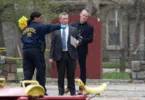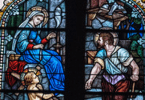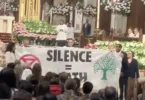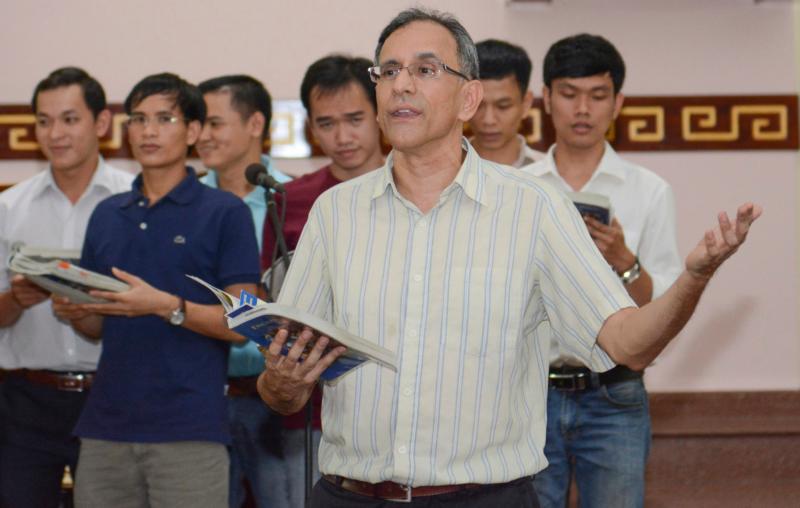
Franciscan Brother Rufino Zaragoza leads a “Song Review” workshop for English-speaking Vietnamese singers at a Catholic church in Saigon, Vietnam, in 2014. The Southern California native is a published composer who presents workshops in the U.S. and Southeast Asia geared to multicultural liturgical ministers, especially within the Vietnamese Catholic community. (CNS photo/courtesy Brother Rufino)
by Mike Nelson
OXNARD, Calif. (CNS) — As a Franciscan serving in the order’s St. Barbara Province on the West Coast, and as a published composer with Oregon Catholic Press, Brother Rufino Zaragoza was often called upon to direct music for his order’s bilingual and trilingual professions of vows and ordinations.
And, as the Franciscans’ formation program received more Vietnamese vocations, he searched for liturgical repertoire that included Vietnamese.
“But I could not find anything,” said the 58-year-old religious, a third-generation Mexican-American born and raised in the east Los Angeles community of Montebello. “Much had been published in English and Spanish — but what was available for mainstream Americans to welcome Vietnamese?”
Long involved in multicultural ministry, Brother Zaragoza set about addressing the need for liturgical music that includes Vietnamese through both his own compositions and by collaborating with OCP’s Vietnam office to translate existing works, like Bernadette Farrell’s “Christ Be Our Light.”
He now leads multicultural workshops in liturgy and music at parishes and conferences all over the U.S. and Southeast Asia, while serving as a liturgical music consultant, based in the Diocese of Orange. His articles are published in liturgical journals, and with Viatorian Father Mark Francis he contributed to “Liturgy in a Culturally Diverse Community,” the Federation of Diocesan Liturgical Commissions’ revised document on multicultural liturgies.
It is hardly a conventional ministry for a religious. But for Brother Zaragoza — nurtured in Franciscan spirituality for more than 30 years — it is his way of living and following St. Francis’ example of “bridge-building and peacemaking.”
“In all of my encounters and intercultural work,” he said, “I hope to imitate that role, of being a border-crosser, so my work can help peoples of different cultures find new ways to encounter each other and have spiritual and musical reciprocity. To have parishes modeling hospitality and cultural understanding is crucial, especially now, in the United States, where there is so much fear of ‘the other’ — be that Hispanics, white Americans or people from the Middle East.”
And, he added, as a brother, “without the power, trappings and responsibilities of an ordained person, I try to be bridge-builder between volunteer choir members, lay professional musicians, clergy and liturgists.”
The Vatican recently released a 50-page reflection on the importance of the vocation of religious brothers and their mission of evangelization, fraternity and sacrifice. Titled “Identity and Mission of the Religious Brother in the Church,” the document was released Dec. 14 in five languages and is meant to be a guide for the whole church.
In an interview from Vietnam, Brother Zaragoza told CNS he discerned his religious vocation while attending Loyola Marymount University in Los Angeles, where he was attracted to the Franciscans.
“I knew I was too young to know what ministry would be my response to the Gospel in service of the world,” he said. “And I was interested in a community that had a variety of ministries and focused more on the common life — shared prayer, common meals and fellowship.”
In religious life, he was “blessed with a wealth of ministry experiences,” including parish life, retreat ministry and volunteer prison ministry, all while composing liturgical music published by OCP. His interest in bilingual (Spanish/English) repertoire for the growing needs of bicultural assemblies led him to compose music for that demographic — and drew him toward Southern California’s burgeoning Vietnamese Catholic community, as well as to Vietnam itself.
“As an American, I had my own cultural lens for working and understanding church, life and reality,” he said. “My experiences of being an ‘outsider’ in an Asian culture and not knowing the language taught me about the importance of intercultural communication.”
After trips to Vietnam and meetings with Vietnamese music directors, sisters and clergy — including those who served English-speaking communities in Vietnam — he presented to OCP a project proposal of a bilingual (Vietnamese-English) songbook, “and they said yes.”
Since then, other songbooks, recordings have been made in both the U.S. and in Vietnam. Brother Zaragoza worked with OCP to help produce English-language resources for convents, seminaries and houses of formation in Vietnam which celebrated weekly Mass in English.
“This small missionary outreach has grown and grown,” he said, “and more small ‘ex-pat’ communities in Southeast Asia are using these songbooks, put together by a team based in Saigon, and printed in Vietnam.”
His experiences, he said, brought about “a conversion that gave me insight to bring back to the USA tools to support mainstream American musicians and liturgists who are trying to welcome various immigrant groups into their parishes, and need multilingual resources for multicultural celebrations. In missiology, I believe this is termed ‘reverse mission.'”
Brother Zaragoza has witnessed, in many parishes, the evolution from multilingual celebrations to multicultural celebrations, “and perhaps, over time, with lots of dialogue and trust, intercultural celebrations.” Each of these phrases, he asserts, is a conversion on behalf of the leaders, to understand their role and others with new eyes.
“Lots of humility and listening need to take place,” he said. “The most important part of intercultural celebrations is that the communities in the parish cannot come together only for Mass a few times each year. There must be other occasions of dialogue, faith sharing, listening to immigration stories, listening to stories of the pioneers of the parish, sharing of food, music, dance and so on.”
Holding a bachelor’s in church music from Mount St. Mary’s College in Los Angeles, and a master’s in theological studies from the Franciscan School of Theology, then in Berkeley and now in Oceanside, Brother Zaragoza continues to ask, “Who is not being served yet?” or “What culture is not being welcome yet?” in mainstream English liturgies, and what resources need to be developed “to let them know that they too are at home in this community.”
Above all, he is grateful for “the gift I have received of Franciscan formation and spirituality,” and for the support, shared prayer, friendship and collaboration of his Franciscan community as he pursues this unique ministry.
“My brothers also challenge me, and keep me humble, and help me keep everything in focus,” he said. “They are my family, and even though not everyone in my province really knows or understands the ministry that I do, I go forth, not as an individual, but as a member of the Franciscan community, in my witness and mission.”

